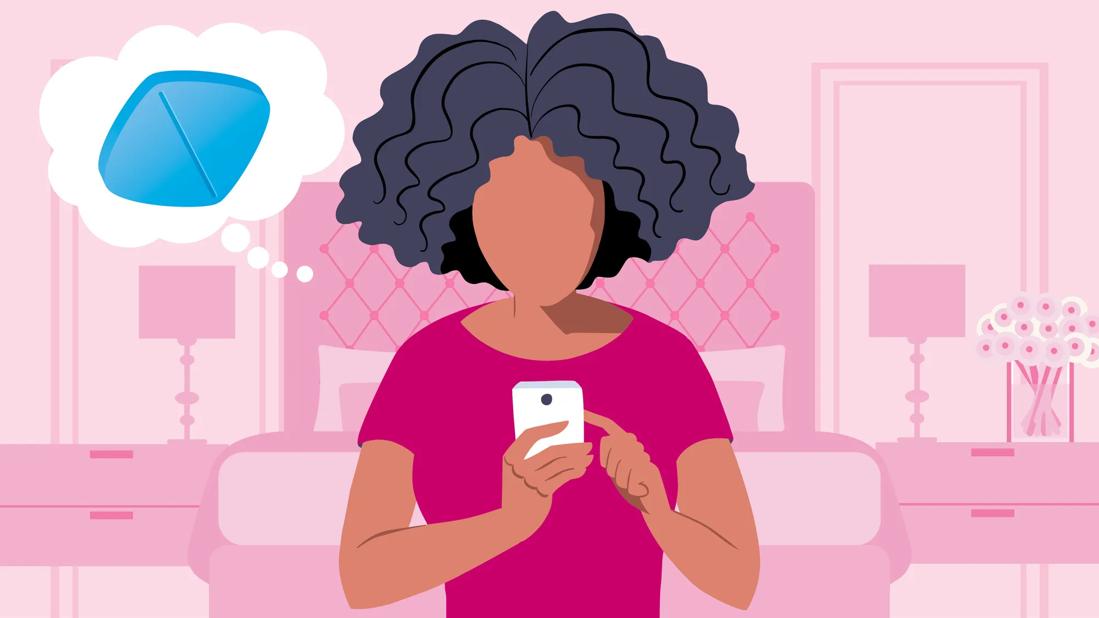The little blue pill might help with physical arousal, but there are better treatments for low libido in women

Image content: This image is available to view online.
View image online (https://assets.clevelandclinic.org/transform/4d8c1896-eaf2-44f0-a080-84b18dbfced6/viagra-woman-1247647583)
Woman researching viagra on her cell phone
Concerns about sex drive and sexual performance are extremely common in women.
Advertisement
Cleveland Clinic is a non-profit academic medical center. Advertising on our site helps support our mission. We do not endorse non-Cleveland Clinic products or services. Policy
Ob/Gyn Salena Zanotti, MD, sees it all the time in her practice: “It’s probably one of the top questions I get asked, and it’s common in adults of all ages.”
We know that Viagra® can help men perform between the sheets. But can women take it, too? Or is there a “Viagra for women” out there?
Dr. Zanotti clears up what Viagra does, and doesn’t do, for women, and what options are available for you.
Technically, yes, women can take Viagra (also known by the generic name sildenafil). But the U.S. Food and Drug Administration (FDA) hasn’t approved it for use by women.
“Viagra is approved for treating erectile dysfunction, nothing more,” Dr. Zanotti clarifies. “It hasn’t proven to be the answer for sexual dysfunction outside of that.”
Viagra works by increasing blood flow to the genitals. For men with erectile dysfunction, that’s a game-changer.
In women, Viagra may increase blood flow to the vulva and vaginal tissues, which could enhance your pleasure by heightening your sensitivity and promoting lubrication. But the benefits likely stop there.
Some women taking Viagra may find that having sex is more pleasurable. (And who can argue with that as a perk?) But that’s not true for everyone. Some women taking Viagra may experience side effects like:
Advertisement
If you have low blood pressure or you’re taking blood pressure medication, Viagra can cause a further drop that may lead to dizziness and even fainting.
And mixing Viagra and alcohol is a big no-no because it can worsen the side effects, Dr. Zanotti warns.
So, is there a Viagra for women?
Kind of.
While Viagra might work on the physical side of things, other FDA-approved treatments can help women with other issues, like sexual desire.
“Viagra might help some women with the physical mechanics of sex, but it’s not going to help with other things that keep you from being ‘in the mood,’” Dr. Zanotti points out.
No pill is going to make sure the laundry is done, the kids are asleep, or that you’re feeling confident in yourself and your relationship. But Dr. Zanotti notes a few medications that may help increase your interest in sex:
Sometimes, sexual dysfunction isn’t about biology — it’s about everything else going on in your life that puts sex on the back burner.
“Sexual health in women is about more than just blood flow,” Dr. Zanotti says. “It’s about your mental health, your relationship, how comfortable you feel in your body and so much more.”
Low libido can be tied to:
Here are a few strategies that may help:
Advertisement
Viagra might sound like a quick fix, but it rarely is. Because the research hasn’t proven that it’s beneficial for women, most healthcare providers consider it a last resort — not a first-line treatment.
While it may improve physical arousal for some, Viagra doesn’t directly impact desire. If you’re struggling with low libido, you’re not alone, and real help is available.
Advertisement

Sign up for our Health Essentials emails for expert guidance on nutrition, fitness, sleep, skin care and more.
Learn more about our editorial process.
Advertisement
Your body’s response to rapid weight loss from the medication may cause shedding
This medication is best used on a limited basis
Authorized take-back programs, services and drop-off locations are the best, safest way to get rid of expired medicine
These illegal supplements have negative impacts for vital organs and may cause psychosis, heart attacks and more
These creams that you apply to your skin can actually help reduce localized pain, swelling and inflammation
Popular among teens, these inhalants give you a quick high, with serious harmful effects
‘Black box warnings’ on medications outline potential risks and important instructions
These similar versions of brand-name drugs are safe, effective and often less expensive
Although it could be used as a moisturizer, this new trend is not recommended
Communicating clear limits helps protect your time, energy and emotional well-being
High cholesterol can be genetic, but testing and treatment can lower your heart disease risk